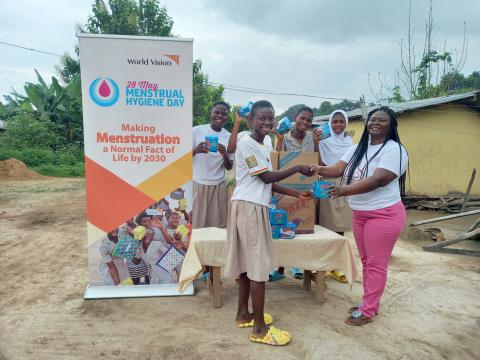Celebrate Menstrual Hygiene Day: Empowering vulnerable girls in Ghana

Story by: Petrina Dery, Project Officer - Healthy Environment And Wellness Programme
As part of activities to commemorate Menstrual Hygiene Day, 30 of the most vulnerable girls living in extreme poverty were identified and supported with a year's supply of sanitary pads at World Vision Ghana's Area Programme in the Kadjebi District. This initiative included 10 girls with disabilities, covering physical disabilities and those who are deaf and mute. This effort is part of World Vision Ghana's Healthy Environment And Wellness (HEAL) technical programme, which aims to ensure that girls with limited access to resources have enough sanitary pads for their menstrual periods.
A monitoring visit to these girls' homes revealed many problems with menstruation. Parents and caregivers are often unable to afford sanitary pads for the girls due to their high cost. They have no choice but to use rags during menstruation. This makes the girls feel very uncomfortable. One of the consequences is that they are distracted during school hours or may choose not to attend school at all.
The HEAL Technical Programme initiative aims to address menstrual hygiene management issues among vulnerable girls, including those with disabilities. As part of the activities, the girls were given demonstrations on how to use sanitary pads and take care of their bodies during menstruation.
Samira, a 16-year-old physically challenged beneficiary, expressed her gratitude to World Vision Ghana for this kind gesture. She said, “One full year supply of sanitary pads is a lot to be thankful for. I will no longer struggle over how to manage my menstruation for the subsequent months. With this, I can now participate in school activities during that time of the month without worrying about soiling myself in class. This boosts my self-confidence and makes me happy.”
This initiative is an interim measure to address the situation while the project seeks long-term solutions. These include collaboration with district-level partners, community, and faith leaders to support menstrual hygiene management among vulnerable girls in the communities where we work.